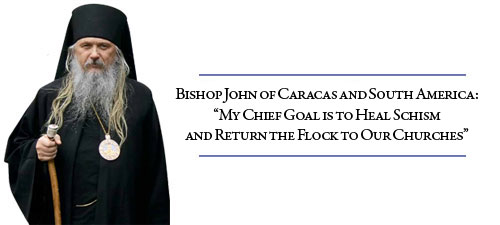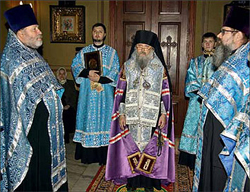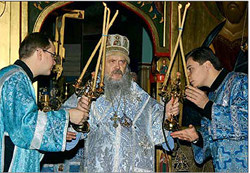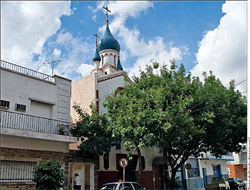
South America first began receiving Orthodox Christians�Greeks, Slavs, Serbs�in the second half of the 19th century. In the 20th century, those who rejected Bolshevik rule in Russia emigrated here, especially Russian officers of the White Army.
Bishop John of Caracas and South America talks to us about why our ancestors merited this praise, how Orthodox parish life will change in the next twenty years and what problems Orthodox Christians now face in Latin America.
The Waves of Russian Emigres
 � Your Grace, over the thirty years that you have served the Russian Orthodox Church, many great changes have taken place, which hardly could have been predicted. How do you envision the future of Orthodoxy in Russia and in South America in the next twenty years?� � Your Grace, over the thirty years that you have served the Russian Orthodox Church, many great changes have taken place, which hardly could have been predicted. How do you envision the future of Orthodoxy in Russia and in South America in the next twenty years?�
� Twenty seems to me like a long time. On the other hand, if we look some twenty years into the past, when we celebrated the 1000-year anniversary of the Baptism of Russia, no one thought that the Iron Curtain would collapse so suddenly, that communion would be reestablished between the two branches of the Russian Orthodox Church, and that they would unite. That is why what is happening in Russia now gives me great hope; in this regard I am an optimist.
The rebirth of Orthodoxy in Russia can be compared to the times of Holy Prince Vladimir, Equal-to-the-Apostles, since today in fact there is a second baptism of Russia. If one looks at what happened after the first baptism: people simply followed the Prince, understanding nothing, they were illiterate, but accepted Christianity with a pure heart, they received baptism and opened themselves up to the influence of the Holy Spirit. Several generations later, it already became known as Holy Russia. The sons of Prince Vladimir, Boris and Gleb, became saints. St Anthony of the Caves went to Mt Athos and returned, bringing back the concept of monasticism. If this were possible then, when people were illiterate, then today, when Holy Russia already exists in our collective memory, and there is a great deal of easily-accessible literature, Orthodoxy can flourish once again much more easily than at that time. I hope that this happens in the next twenty years.
� You have spent time with various generations of Russian emigres, how are they different?
� The first wave included the exiled White emigres. The second consisted of those who did not wish to return to the USSR after World War II�exiles (they lived on occupied territories and later fled to the West from the approaching front. For instance, in Latvia, 10% of the population became refugees).
These included Soviet prisoners-of-war, Soviet citizens who were transported West to work for the Germans. They all understood well that Siberian exile and camps awaited many of them upon their return. The third and fourth waves left of their own accord. The third consisted primarily of Jewish emigres. This didn�t mean they were Jews themselves, but they were sometimes considered Jewish through marriage or by one of their parents. Among them were many Orthodox believers, and those who weren�t, many became believers.
The first and second waves always fought for their �Russianness,��always looked towards Russia with hope that even if they themselves couldn�t, at least their children or grandchildren could return to their Homeland. At the present time, our churches are attended by descendants of the first wave of emigres. Among them is one old but energetic man who was born in Russia before the Revolution. His name is Valentin Vasilievich Khasapov. He is 96, and lives in Buenos Aires.
Also interesting is that the children of the first two waves of emigres preserved their Russian language, they speak Russian well. In comparison, those who came ten years ago speak Russian with �swallowed consonants,� and include Spanish terms, which is a remarkable thing. There are not many of them in our churches. I have not yet met people of the third wave in Argentina. This doesn�t mean they don�t exist there, I simply haven�t met any. Many members of the fourth wave attend churches of the Moscow Patriarchate. I serve at Resurrection Cathedral in Buenos Aires and also fulfill the functions of a priest, hearing confessions, administering Communion, since we have a lack of priests, so I have more direct contact with our flock.
� How many parishioners do you have?
� On Sundays we have about thirty people, on Pascha, several hundred. There are few young people, the average age is 40 and above. In addition to Russians, we have native Argentinians, and one of them is now studying at the seminary in Jordanville, NY. We have weekend services, the main and Twelve feast days, when we also serve vigil. If a holiday falls on a weekday, very few people come to church: everyone is at work. Then I might conduct divine services at home. The lack of parishioners is due in part to the blow that the Russian Orthodox Church Outside of Russia suffered from the schism in Latin America. The background of the situation is that in 2007, a group of clergymen and laity in Latin America went into a schism wrought by Agathangel (Pashkovsky), a former ROCOR bishop. He refused to accept the Act of Canonical Communion between the Church Abroad and the Moscow Patriarchate. Defrocked for his schismatic actions, Agathangel declared himself �metropolitan� and �first hierarch� of the Church Abroad. A number of parishes in South America followed him: some in Brazil, a few in Argentina, as well as others in other countries. All of the �Agathangelite� parishes in South America are administered by a �Bishop Gregory of Sao Paolo and South America.� This man is the defrocked Protopriest Georgy Petrenko, who became a widower and then became a monk, taking the name Gregory. I am studying this matter now, searching for the reasons for the support of schismatics specifically in Latin America, but I have not yet found an answer. For instance, I can find common ground with Old-Rite believers, because the break with them was ecclesiastical, all the differences are in church matters.
These schismatics��break is not ecclesiastical. The reasons, in my opinion, are political, psychological and socio-psychological. Plus, there is a general spirit of resistance which reigns in the minds and hearts of the people of Latin America. In particular, the schismatics continue to insist that Russia is simply an extension of the Soviet Union, that the Russian Orthodox Church includes members of the KGB, etc. We have no contact with the schismatics now. Although we are open to dialog and are eager to explain that the Act of Canonical Communion with the Moscow Patriarchate, signed in May 2007, is no �betrayal� or �apostasy.� But the schismatics will hear none of it. As a bishop, I am faced with this main challenge�to heal the schism, to bring back the flock, and the churches themselves (such as Holy Trinity Cathedral in Buenos Aires, which is occupied by the schismatics). And to raise the level of church life among the people, because they have moved far away from the Church.
But it isn�t all bad. The situation in Chile gives me great hope. Most of the Orthodox flock there are Chileans who converted to Orthodoxy from Catholicism. At first glance this may seem strange, for the Catholic Church is very strong in Chile, and Catholics are serious in providing religious education. Still, former Catholics have told me that they convert to Orthodoxy since it answers their search for the true faith. But on the whole, for South-American countries, the opposite is the main trend�people are moving away from the Church, they enter into mixed marriages, they assimilate, and their children, as a rule, although baptized Orthodox, do not preserve their Orthodox faith. It is an important point that there is a priest in Chile, himself Chilean, who is an active missionary.
Most of the people who attend the churches of the Moscow Patriarchate are also Chilean. There is no church in Santiago, having been taken by the schismatics. But we established a chapel in an apartment, and hold divine services there. The Orthodox community in Chile is more vibrant than in Argentina. We are now building a church dedicated to St Silouan of Athos in the city of Concepcion (the second-largest city in Chile), where the priest lives. Orthodox Arabs there donated land, and Russians, Chileans and a few Serbs are donating their resources. This will be the only Orthodox church in the city. Its rector is Protopriest Alexei Aedo.
 � How many parishes do you have in all in your diocese? � How many parishes do you have in all in your diocese?
� These are uncertain numbers. Some of our parishes, as I said, are in schism. We still count them as our own. We also have others where we have very few divine services, for instance, once a month or even more rarely, sometimes just once a year. In Venezuela we have six parishes, and two priests, in Chile was have three communities, one priest and one deacon, in Argentina three active parishes (one is the cathedral). Paraguay has one parish. A priest from Russia recently arrived. In Brazil there are five active parishes which all went into schism, as did the sole church in Uruguay.
� Maybe changing divine services into Spanish language might attract a greater flock from among the native population? You said in particular, that your three parishes in Chile serve in Spanish.
� Yes, they serve in Spanish in Chile. But when I go there to serve, my part of the service is in Church Slavonic (the flock understands this), and the rest of the service is in Spanish. Incidentally, they also use Russian and Greek singing. There is one problem I would like to tell you about. This regards the descendants of Russian emigres who were born in Argentina and don�t understand Church Slavonic. But they don�t want to attend a church where they sing in Spanish, since they could no longer call themselves Russian and nothing will tie them to Russia. I think that the problem of switching to Spanish in divine services is a matter left to time. You asked about the future of Orthodoxy in Latin America: it is possible that our future involves the use of Spanish in divine services everywhere. The Antiochians already made the change; they have four dioceses in South America. In Argentina and Chile they switched to Spanish completely, in Brazil they switched to Portuguese, and in Venezuela they serve in Arabic. If the Russian, Greek and Serbian communities change to Spanish-language divine services, then they will probably all merge into one Church, because the divisions according to national identities in this case would make no sense, in my opinion. I think that we should switch to Spanish, but I am not the person to do this, since I am not sufficiently proficient in the language.
� In one interview, you talked about the future of work with Old-Rite communities�
� We must study this matter. In South America, especially in Brazil and Bolivia, there are many Old Believers of the Chasovenny Accord. There are Old Believers in Uruguay. In practice, they don�t have a priesthood, but they do not declare that the grace of priesthood has been lost to the world. I wish to get to know them with the hope of attracting them under our omophorion.
 � What is your ecclesiastical structure like? Does the laity have any problems seeking out clergy? � What is your ecclesiastical structure like? Does the laity have any problems seeking out clergy?
� We have so few clergymen, and they are so far from each other, that there is in practice very little choice. In Moscow, you might have several churches on the same street. The distances involved prevent the clergymen from meeting often to discuss spiritual matters they have in common. We cannot organize internet conferences, since many of the older clergymen are unaccustomed to the technology. And of course if the priests are faced with specific questions in their spiritual ministry, then we resolve them directly by telephone. Often these are questions that arise within families where the spouses belong to different churches; Catholic and Orthodox.
� Vladyko, how closely do you feel God�s presence in your life?
� I think it is natural when God is present in us and we do not pay attention to this, but we immediately sense when He is absent. I would like to talk about another matter. In South America, I often get the sense that the people here are on the outskirts of civilization. Not only because they live in humble circumstances, but because they are geographically distant from the rest of the world. What I see is that the religiosity of people is not sensed very strongly in Argentina, while Chileans, on the contrary, are very persistent in their search for the true faith. Although the believers in Argentina are mostly Catholic, among them is a tendency to �liberation theology.� This is a South-American concept wherein politics have replaced church teaching. This phenomenon, it seems to me, plays a big role in our schism, but among Catholics this is politically leftist, but for us it is right-wing. These schismatics consider themselves monarchists, but with some fascist tendencies. For instance, they always supported military dictatorships, they are opposed to Russia, which in their minds is still ruled by communists, etc.
� What would you wish for the Orthodox faithful of Russia?
� That they strengthen in their Orthodoxy, that they be the leavening in society, that they acquire the Spirit of Peace. If even a few people stand firmly in their faith, this cannot fail to influence all those around them. And if a person confesses Christianity but doesn�t live a Christian life-style, he turns others away from Christianity. Each of us must preach the Gospel in deed. Not each of us can preach verbally, but every one of us can serve as a good example in our lives, by living according to the Gospel. It is said: �Let your light so shine before men, that they may see your good works, and glorify your Father which is in heaven� (Matthew 5:16).
Interviewed by Alexey Reutsky�
Journal of the Moscow Patriarchate
|